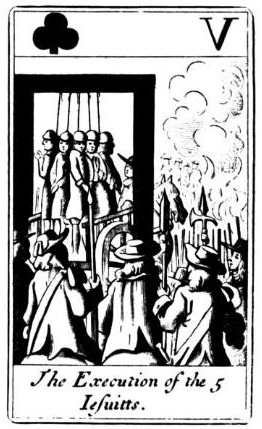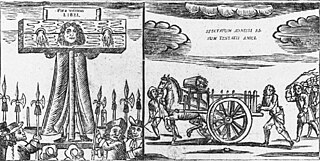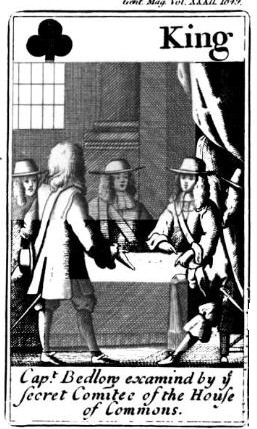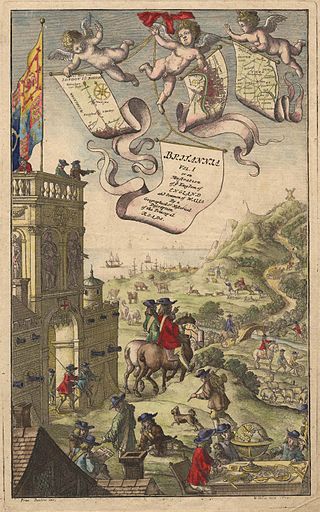
A ballad is a form of verse, often a narrative set to music. Ballads derive from the medieval French chanson balladée or ballade, which were originally "dance songs". Ballads were particularly characteristic of the popular poetry and song of Britain and Ireland from the Late Middle Ages until the 19th century. They were widely used across Europe, and later in Australia, North Africa, North America and South America.

Titus Oates was an English priest who fabricated the "Popish Plot", a supposed Catholic conspiracy to kill King Charles II.

The Popish Plot was a fictitious conspiracy invented by Titus Oates that between 1678 and 1681 gripped the kingdoms of England and Scotland in anti-Catholic hysteria. Oates alleged that there was an extensive Catholic conspiracy to assassinate Charles II, accusations that led to the executions of at least 22 men and precipitated the Exclusion Bill Crisis. During this tumultuous period, Oates weaved an intricate web of accusations, fueling public fears and paranoia. However, as time went on, the lack of substantial evidence and inconsistencies in Oates's testimony began to unravel the plot. Eventually, Oates himself was arrested and convicted for perjury, exposing the fabricated nature of the conspiracy.

Thomas Dangerfield was an English conspirator, who became one of the principal informers in the Popish Plot. His violent death at the hands of the barrister Robert Francis was clearly a homicide, although whether the killing was murder or manslaughter was a matter of considerable public debate at the time.

William Bedloe was an English fraudster and Popish Plot informer.

Francis Barlow was an English painter, etcher, and illustrator.
Robin Hood's Chase is Child ballad 146 and a sequel to Child ballad 145, "Robin Hood and Queen Katherine". This song has survived as, among other forms, a late seventeenth-century English broadside ballad. It is one of several ballads about the medieval folk hero that form part of the Child Ballads, a comprehensive collection of traditional English and Scottish ballads.
Robin Hood and the Butcher is a story in the Robin Hood canon which has survived as, among other forms, a late seventeenth-century English broadside ballad, and is one of several ballads about the medieval folk hero that form part of the Child ballad collection, which is one of the most comprehensive collections of traditional English ballads. It may have been derived from the similar Robin Hood and the Potter.
Robin Hood's Golden Prize is Child ballad 147. It is a story in the Robin Hood canon which has survived as, among other forms, a late seventeenth-century English broadside ballad, and is one of several ballads about the medieval folk hero that form part of the Child ballad collection, which is one of the most comprehensive collections of traditional English ballads.
Events from the year 1678 in England.
Miles Prance was an English Roman Catholic craftsman who was caught up in and perjured himself during the Popish Plot and the resulting anti-Catholic hysteria in London during the reign of Charles II.
This is a timeline of significant events in comics prior to the 20th century.
The history of comics has followed different paths in different parts of the world. It can be traced back to early precursors such as Trajan's Column, in Rome, Egyptian hieroglyphs and the Bayeux Tapestry.
"A Ballad upon the Popish Plot" is an early modern English broadside ballad about a fabricated conspiracy known as "The Popish Plot" that occurred between 1678 and 1681 in the kingdoms of England and Scotland, during a period of widespread social and cultural prejudice against Catholicism. The song records an indictment of the Plot—a crucial consequence of national religious conflict that arguably began with the English Reformation—in the form of the ballad, one of the most time-honored and influential styles of popular music.
"The Lamentable and Tragical History of Titus Andronicus,"also called"Titus Andronicus' Complaint," is a ballad from the 17th century about the fictional Roman general, Titus, and his revenge cycle with the Queen of the Goths. Events in the ballad take place near the end of the Roman Empire, and the narrative of the ballad parallels the plot of William Shakespeare's play Titus Andronicus. Scholarly debate exists as to which text may have existed first, the ballad or the play. The ballad itself was first entered on the Stationers' Register in 1594, the same year the play was entered. Surviving copies of the ballad can be found in the British Library, in the Huntington Library, and at Magdalene College, Cambridge. Online copies of the facsimiles are also available for public consumption at sites such as the English Broadside Ballad Archive.
A Voyage to Virginia is an English broadside ballad. Although surviving copies of the broadside date back to the late 17th century, the ballad could have been available in the early to mid-17th century. The ballad is told from the point of view of a soldier, who is saying farewell to his love, Betty. Copies of the broadside can be found at the British Library, the National Library of Scotland, and Magdelene college.
The complaint and lamentation of Mistress Arden of Feversham in Kent is a 17th-century English broadside ballad that details the murder of Thomas Arden by his wife Alice, her lover Mosby, and several others in 1551 in the town of Faversham, Kent. The ballad's full title is "The complaint and lamentation of Mistresse Arden of / Feversham in Kent, who for the loue of one Mosbie, hired certaine Ruffians / and Villaines most cruelly to murder her Husband; with the fatall end of her and her / Associats." It was entered into the Stationers' Register on July 8, 1663. The ballad is framed as the scaffold confession of Alice Arden, related in the moments before her execution by burning at the stake. The events in the ballad closely parallel both the source text for the event, Raphael Holinshed's Chronicles of England, Scotland, and Ireland, and the anonymous 16th-century English play Arden of Faversham. The British Library holds the only existing copy of the ballad in their Roxburghe collection.
A Pleasant Ballad of Tobias is an English broadside ballad from the late 17th century. It is based on the story of Tobias from The Book of Tobit, one of the Apocrypha from the Dead Sea Scrolls. It tells the story of a young man, Tobias, who travels to Media to reclaim a debt from his father's friend, Gabael. He is accompanied by a guiding angel, Azarius. In the Book of Tobit, it is revealed that Azarius is actually the archangel Raphael. Azarius sets up a match between Tobias and Gabael's daughter, Sarah. Sarah has already had seven husbands, all of whom were killed by an evil spirit who is in love with her and won't allow any man to become her husband. Azarius uses the holy spirit to destroy the evil spirit's curse, and Sarah and Tobias are happily married. It is sung to a "pleasant new tune." Copies of the ballad can be found at the University of Glasgow library and the National Library of Scotland.
The Low Country Soldier is an English broadside ballad dating back to the late 17th- or early 18th-centuries about a soldier who returns to England as a poor beggar. After pleading with various people to give him money, he decides to forgo the life of a beggar and becomes a highwayman. Not to be confused with The Low Country Soldier Turned Burgomaster. Copies of the broadside can be found at the British Library, the National Library of Scotland, the University of Glasgow Library and Magdalene College, Cambridge.

Text comics or a text comic is a form of comics where the stories are told in captions below the images and without the use of speech balloons. It is the oldest form of comics and was especially dominant in European comics from the 19th century until the 1950s, after which it gradually lost popularity in favor of comics with speech balloons.







